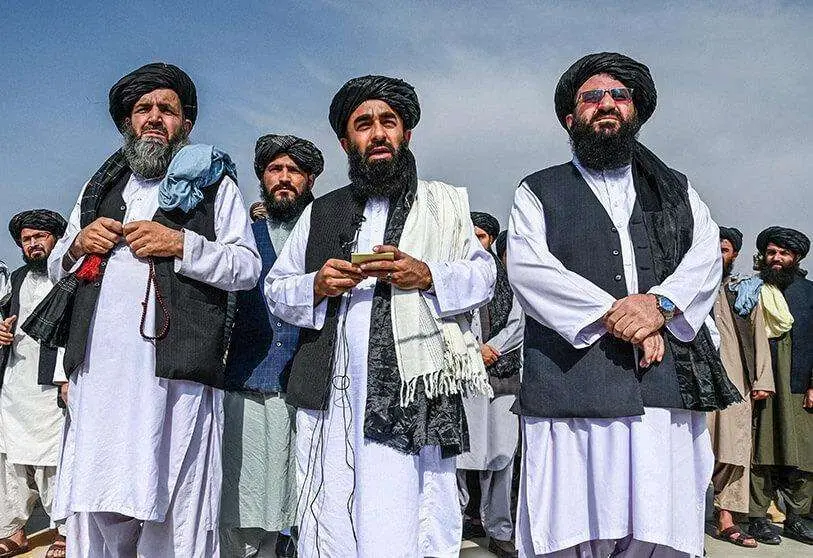Taliban make show of force as they remind the US of their withdrawal

The Taliban celebrated on Wednesday the first anniversary of the "liberation" of Afghanistan after the hasty withdrawal of US troops a year ago, a date the Islamists used to make a show of force in a parade in which they used numerous artillery from the "invaders".
The parade at the former US base at Bagram, the iconic stronghold of foreign troops during the war, was also an opportunity for the Taliban government to show off its reformed armed forces, which it had to build almost from the ground up after the end of the war and the disintegration of the old army.
According to the Ministry of Defence, the new "Islamic Army" has 150,000 military and police officers, including eight army corps responsible for defence in eight regional divisions, each with at least 3,000 soldiers.
The formation of these forces, as well as the reactivation of the military equipment left behind by the Americans and the troops of the former government, is now one of the great prides of the Taliban government, the Ministry of Defence acknowledged to Efe.
But to open the parade, the Islamist leaders chose another pride more typical of their military tactics: the Istishhad unit, as the suicide brigade that originated during the war is known, and which now forms an integral part of their defence muscle.
In addition, under the watchful eye of much of the Islamist government's top brass on the stage, the parade showcased the complex artillery, with the parade of hundreds of Taliban soldiers dressed in combat uniforms, or fleets of motorbikes, guns, or armoured vehicles, including tanks.
In everyone's memory is that night on 30 August last year, when one minute before midnight the last US contingent flew out of Afghanistan, ending two decades of war after the US invasion in 2001.
Two weeks earlier, on 15 August, the Taliban had returned to power with the seizure of Kabul after a devastating offensive that caught everyone off guard, triggering a chaotic and desperate evacuation of foreign troops and their workers.
"We never thought that day would come, even a few days before the collapse of the previous regime it was not believed that we would capture a single province, but everything changed dramatically. Thanks to God's help and the sacrifices of our comrades we have an Islamic government," Taliban Momen Khan Niazi told Efe.
The celebrations began last night with fireworks lighting up the Afghan sky, bringing hundreds of Islamists and onlookers onto the streets, dancing armed and cheering as they waved their white flag inscribed with the Shahada, used as a symbol of the fundamentalists' self-styled Islamic Emirate, now ubiquitous in Afghanistan.
During the day, declared a bank holiday in Afghanistan, the Taliban insisted on a demand they have been repeating since they came to power: the release of $9 billion of Afghan funds frozen abroad.
For a year, without access to their reserves and international banking, the Taliban have been unable to draw on Afghanistan's money and their precarious government operates with almost no supplies to meet the needs of a country burdened by decades of conflict, famine, and the onslaught of natural disasters.
"They have looted everything and then they say Afghans are in poverty," said the prime minister of the interim government, Mullah Hassan Akhund, speaking from Bagram.
The advance of the withdrawal of international troops led to the accelerated collapse of the security of the then Afghan government, which was largely dependent on the Americans, the subsequent fall of one provincial capital after another to the Taliban and the final desperate evacuation.
Those images of chaos at Kabul airport with thousands of Afghan collaborators with allied troops trying to flee the country in fear of Taliban reprisals remain in the minds of many, although for the Islamists the important scene was that last US plane taking off from the airport.
"This day was our dream, we achieved our dream of the invader being driven out of the country," said Akhund, with the country now "free, where everyone can go wherever they want".
However, as was the case during their first regime between 1996 and 2001 before the US invasion, the Taliban have successively curtailed women's rights on the basis of what they say is Sharia or Islamic law, such as prohibiting them from travelling unless accompanied by a male family member.
A vehicle bombing in the capital also reminded Afghans today that peace has not fully returned to Afghanistan, with attacks mostly claimed by the jihadist group Islamic State (IS), the main threat to the regime.
Two civilians were killed and three others wounded in the blast, police spokesman Mohammad Yaseen told Efe. The attack was aimed at a convoy of Islamist security forces, he said, but "fortunately it missed its target".









